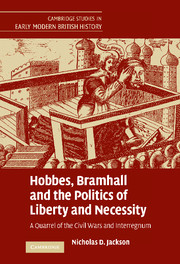 Hobbes, Bramhall and the Politics of Liberty and Necessity
Hobbes, Bramhall and the Politics of Liberty and Necessity Book contents
- Frontmatter
- Contents
- Acknowledgments
- List of abbreviations
- Note on dates and style
- Introduction
- 1 Bishop Bramhall, the ‘Great Arminian’, ‘Irish Canterbury’ and ‘Most Unsound Man in Ireland’, 1633–1641
- 2 Bishop Bramhall, the Earl of Newcastle, Thomas Hobbes and the First English Civil War
- 3 Hobbes's flight to France, De Cive and the beginning of the quarrel with Bramhall, summer 1645
- 4 An epistolary skirmish, 1645–1646: Bramhall's ‘Discourse’, Hobbes's ‘Treatise’ and Bramhall's ‘Vindication’
- 5 Bramhall and the royalist schemes of 1646–1650
- 6 Hobbes and Leviathan among the exiles, 1646–1651
- 7 The public quarrel: Hobbes, Of Liberty and Necessity, 1654, Bramhall, Defence of True Liberty, 1655 and Hobbes, Questions concerning Liberty, Necessity and Chance, 1656
- 8 Castigations of Hobbes's Animadversions and The Catching of Leviathan, 1657–1658: Hobbes as Leviathan of Leviathans
- 9 The Restoration and death of Bramhall and Hobbes's last word, 1668
- Conclusion
- Bibliography
- Index
- Cambridge Studies in Early Modern British History
7 - The public quarrel: Hobbes, Of Liberty and Necessity, 1654, Bramhall, Defence of True Liberty, 1655 and Hobbes, Questions concerning Liberty, Necessity and Chance, 1656
Published online by Cambridge University Press: 17 July 2009
- Frontmatter
- Contents
- Acknowledgments
- List of abbreviations
- Note on dates and style
- Introduction
- 1 Bishop Bramhall, the ‘Great Arminian’, ‘Irish Canterbury’ and ‘Most Unsound Man in Ireland’, 1633–1641
- 2 Bishop Bramhall, the Earl of Newcastle, Thomas Hobbes and the First English Civil War
- 3 Hobbes's flight to France, De Cive and the beginning of the quarrel with Bramhall, summer 1645
- 4 An epistolary skirmish, 1645–1646: Bramhall's ‘Discourse’, Hobbes's ‘Treatise’ and Bramhall's ‘Vindication’
- 5 Bramhall and the royalist schemes of 1646–1650
- 6 Hobbes and Leviathan among the exiles, 1646–1651
- 7 The public quarrel: Hobbes, Of Liberty and Necessity, 1654, Bramhall, Defence of True Liberty, 1655 and Hobbes, Questions concerning Liberty, Necessity and Chance, 1656
- 8 Castigations of Hobbes's Animadversions and The Catching of Leviathan, 1657–1658: Hobbes as Leviathan of Leviathans
- 9 The Restoration and death of Bramhall and Hobbes's last word, 1668
- Conclusion
- Bibliography
- Index
- Cambridge Studies in Early Modern British History
Summary
However much Bramhall had to do with Hobbes's disgrace and subsequent departure from France at the end of 1651, the bishop's main concern in the late 1640s and early 1650s was not to carry out a vendetta against a political philosopher whom he deemed noxious, and who had crossed him in a debate before the Marquess of Newcastle and afterwards in writing. To be sure, it was important to remove Hobbes as far away as possible from the new king. For the author of the Elements of Law, De Cive, the ‘Treatise’ and Leviathan was harmful to the anglican and constitutional royalist cause embodied and espoused by Bramhall. To discredit and expel Hobbes was clearly in the interest of the bishop of Derry. What might have worried Bramhall more during the early 1650s – after the failure of the Scots-presbyterian restoration venture of 1650–1 – was the possibility of the king's turning Roman catholic. Henrietta Maria's children and the émigré entourage of the Stuarts were all susceptible in these troubled years. Since Charles's Scottish alliance had proved fruitless, the Roman catholics on the continent now had their opportunity to propose an alliance for the purpose of restoring the Stuarts. As support from the dominant faction of Scots had required covenanting on the part of Charles, so support from Roman catholics would require some substantial concessions and promises, if not conversion, on the part of the young king.
- Type
- Chapter
- Information
- Hobbes, Bramhall and the Politics of Liberty and NecessityA Quarrel of the Civil Wars and Interregnum, pp. 180 - 219Publisher: Cambridge University PressPrint publication year: 2007


